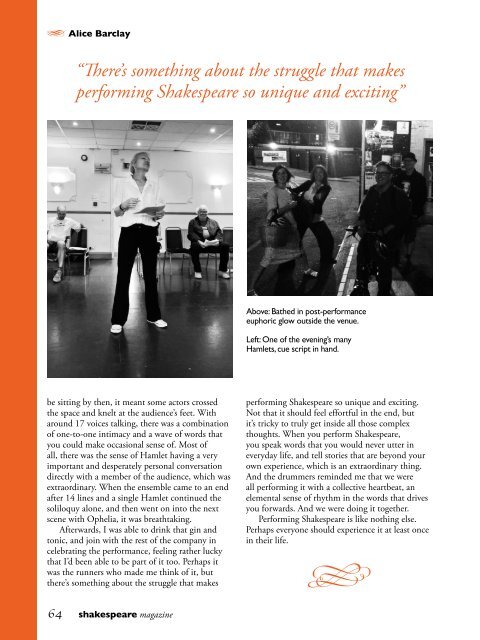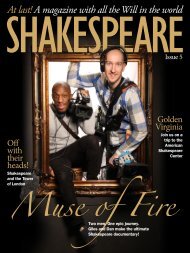Shakespeare Magazine 14
Hamlet is the theme of Shakespeare Magazine Issue 14, with each and every article devoted to the fictional Prince of Denmark and the play that bears his name. Rhodri Lewis asks “How Old is Hamlet?” while Samira Ahmed wonders “Why do Women Love Hamlet?” and we review recent productions of the play starring Tom Hiddleston and Andrew Scott. There's a set report from the making of Daisy Ridley's Ophelia movie and a visit to Hamlet's historic home, Kronborg Castle. We also delve deep into the Victorian Illustrated Shakespeare Archive's Hamlet collection, while Gyles Brandreth tells us about his family production of the play, and Alice Barclay recounts how she taught a group of amateur actors to become Hamlet.
Hamlet is the theme of Shakespeare Magazine Issue 14, with each and every article devoted to the fictional Prince of Denmark and the play that bears his name. Rhodri Lewis asks “How Old is Hamlet?” while Samira Ahmed wonders “Why do Women Love Hamlet?” and we review recent productions of the play starring Tom Hiddleston and Andrew Scott. There's a set report from the making of Daisy Ridley's Ophelia movie and a visit to Hamlet's historic home, Kronborg Castle. We also delve deep into the Victorian Illustrated Shakespeare Archive's Hamlet collection, while Gyles Brandreth tells us about his family production of the play, and Alice Barclay recounts how she taught a group of amateur actors to become Hamlet.
Create successful ePaper yourself
Turn your PDF publications into a flip-book with our unique Google optimized e-Paper software.
Alice Barclay<br />
“There’s something about the struggle that makes<br />
performing <strong>Shakespeare</strong> so unique and exciting”<br />
Above: Bathed in post-performance<br />
euphoric glow outside the venue.<br />
Left: One of the evening’s many<br />
Hamlets, cue script in hand.<br />
be sitting by then, it meant some actors crossed<br />
the space and knelt at the audience’s feet. With<br />
around 17 voices talking, there was a combination<br />
of one-to-one intimacy and a wave of words that<br />
you could make occasional sense of. Most of<br />
all, there was the sense of Hamlet having a very<br />
important and desperately personal conversation<br />
directly with a member of the audience, which was<br />
extraordinary. When the ensemble came to an end<br />
after <strong>14</strong> lines and a single Hamlet continued the<br />
soliloquy alone, and then went on into the next<br />
scene with Ophelia, it was breathtaking.<br />
Afterwards, I was able to drink that gin and<br />
tonic, and join with the rest of the company in<br />
celebrating the performance, feeling rather lucky<br />
that I’d been able to be part of it too. Perhaps it<br />
was the runners who made me think of it, but<br />
there’s something about the struggle that makes<br />
performing <strong>Shakespeare</strong> so unique and exciting.<br />
Not that it should feel effortful in the end, but<br />
it’s tricky to truly get inside all those complex<br />
thoughts. When you perform <strong>Shakespeare</strong>,<br />
you speak words that you would never utter in<br />
everyday life, and tell stories that are beyond your<br />
own experience, which is an extraordinary thing.<br />
And the drummers reminded me that we were<br />
all performing it with a collective heartbeat, an<br />
elemental sense of rhythm in the words that drives<br />
you forwards. And we were doing it together.<br />
Performing <strong>Shakespeare</strong> is like nothing else.<br />
Perhaps everyone should experience it at least once<br />
in their life.<br />
<br />
64 shakespeare magazine

















